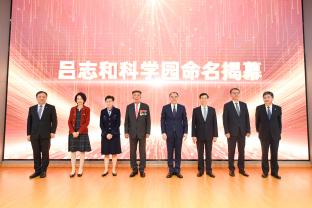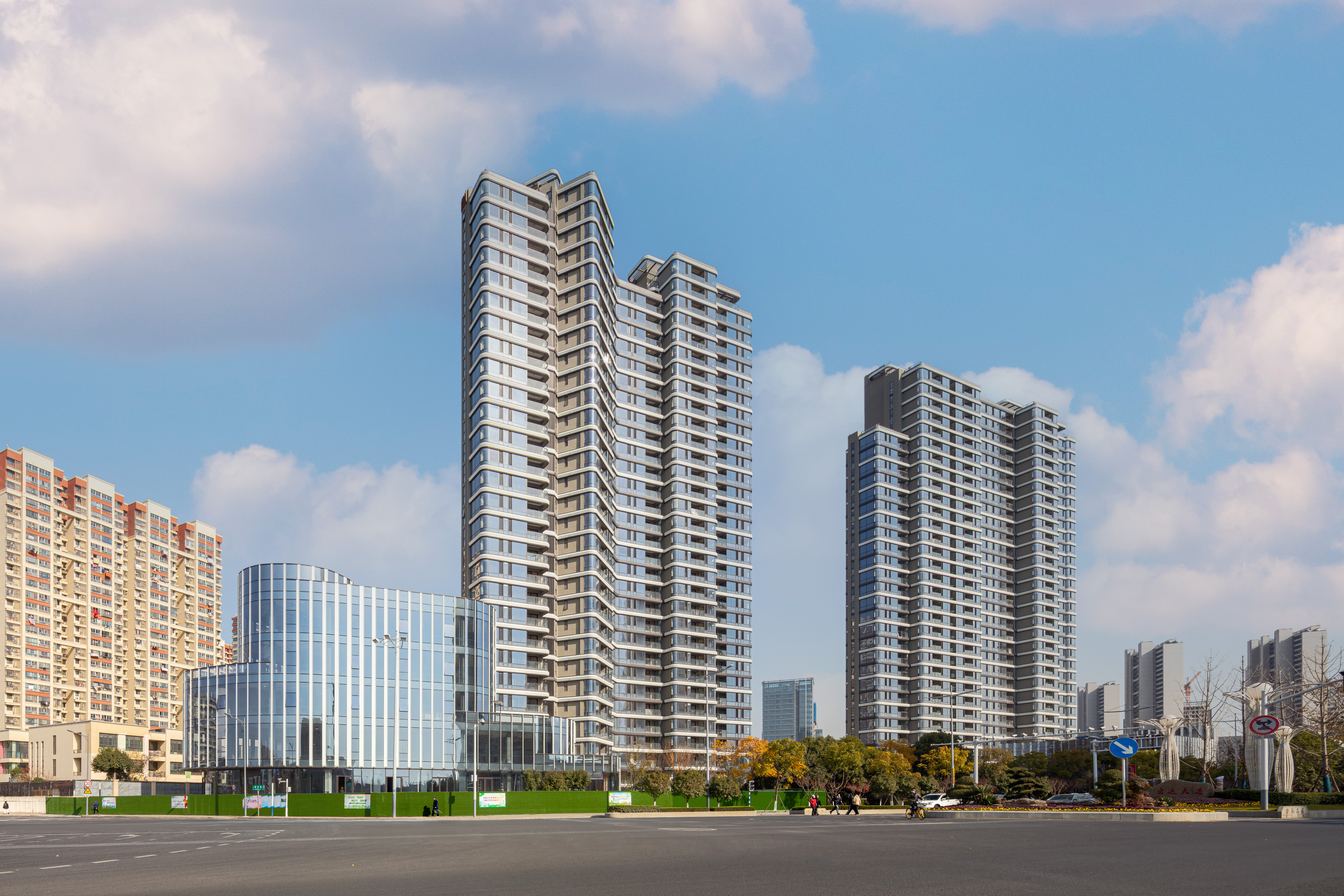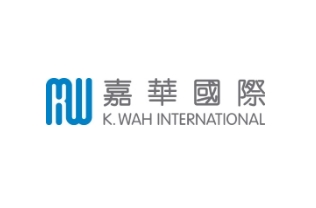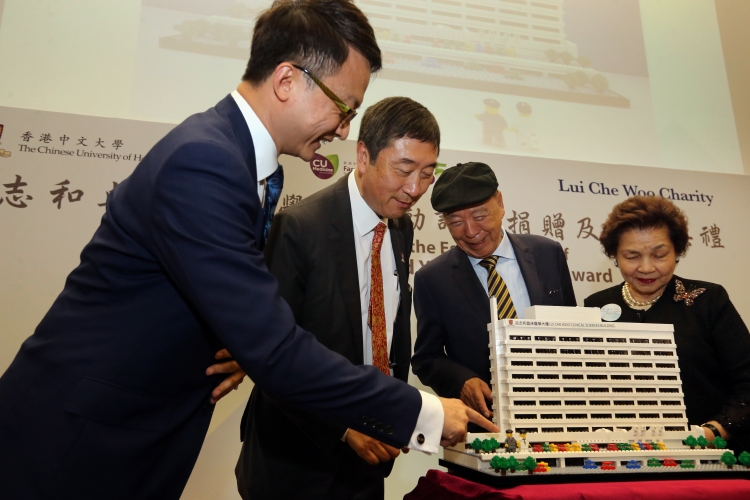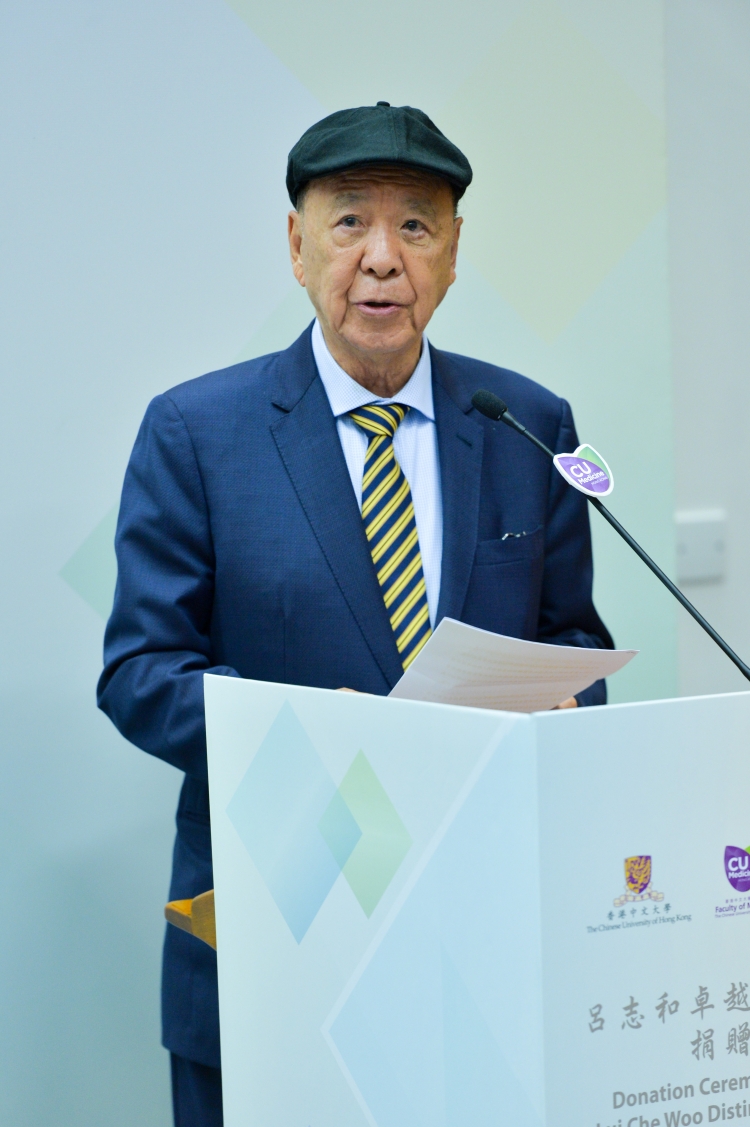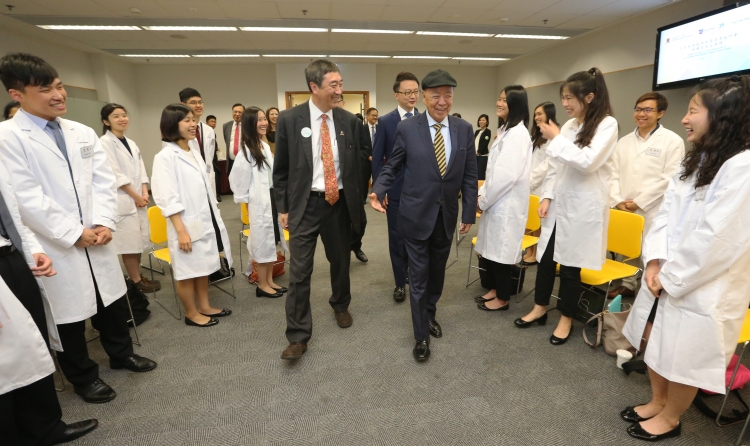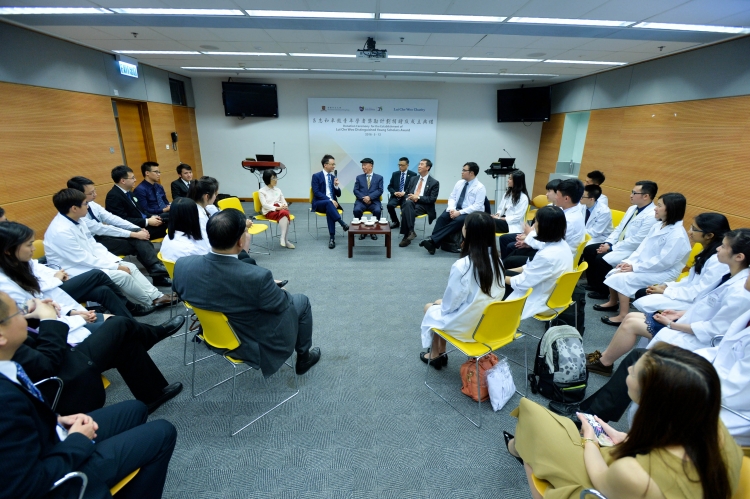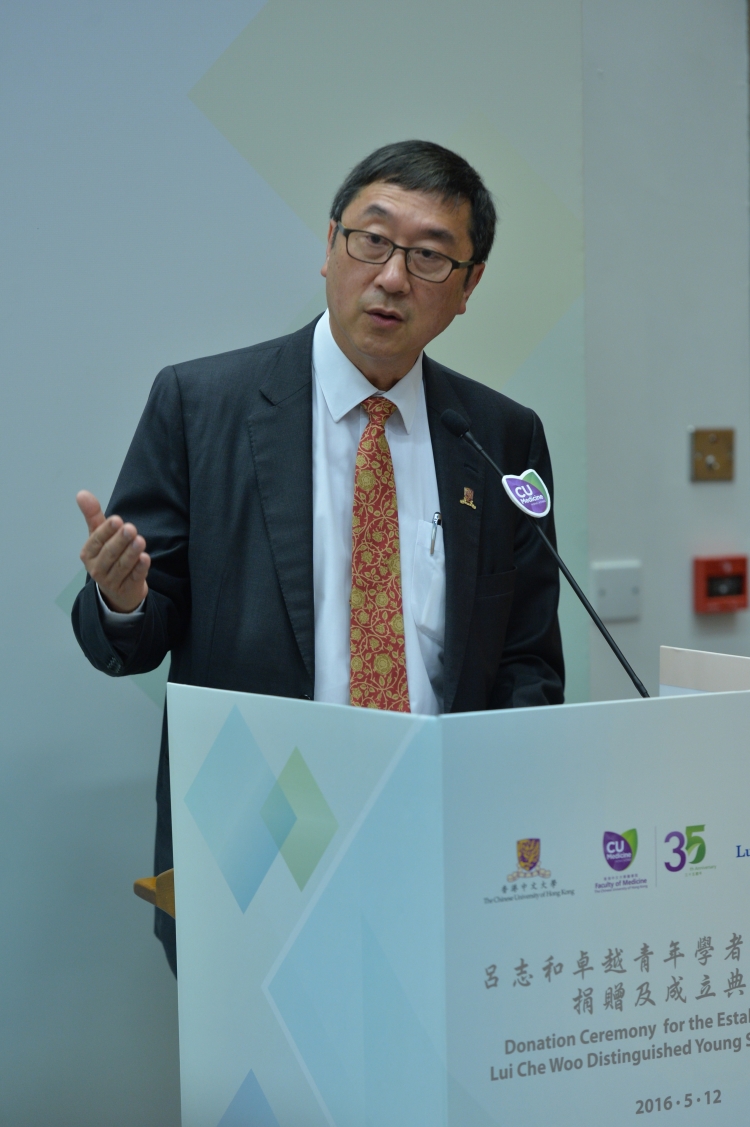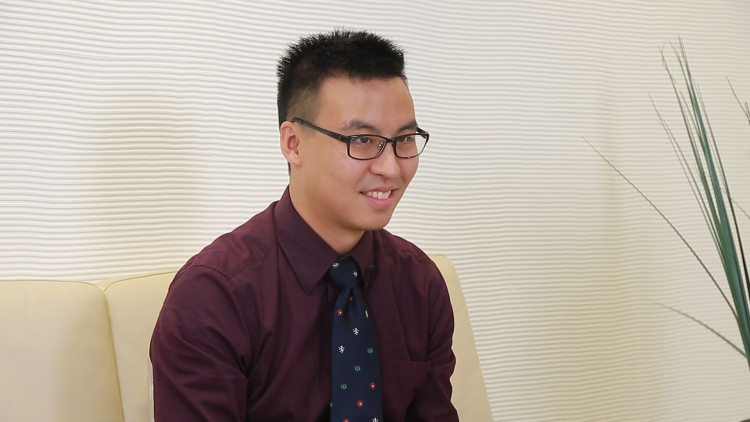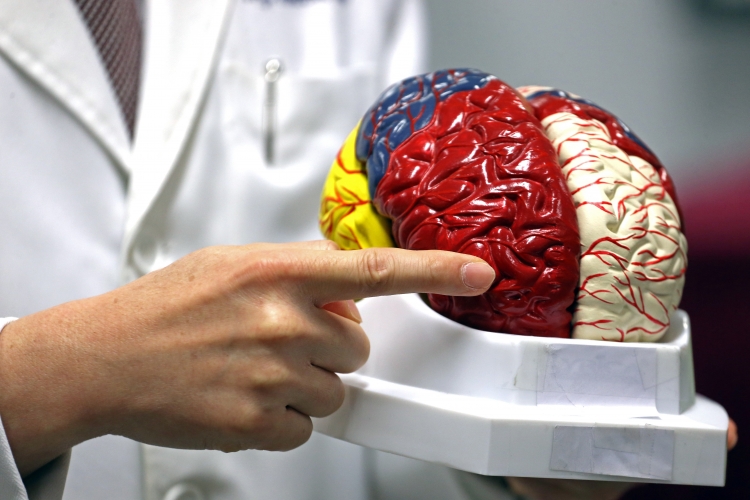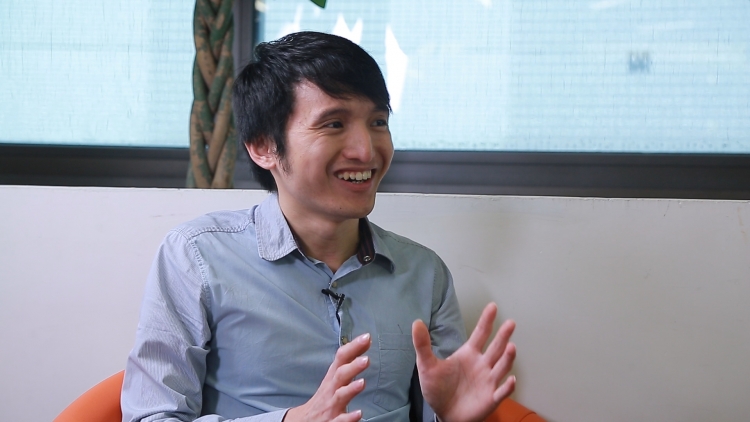K. Wah News & Feature Stories
Young medical students encouraged to serve Hong Kong
“Lui Che-woo Distinguished Young Scholars Award” launch in CUHK
“As a doctor, I aspire to contribute to new knowledge in medicine, instead of curing patients by applying known medical knowledge only.” This is what a young doctor, a graduate of the Faculty of Medicine of the Chinese University of Hong Kong (CUHK) who hoped to commit himself to medical research, told Dr Lui Che-woo, Chairman and Founder of K. Wah Group (the “Group”), during the founding ceremony of the “Lui Che Woo Distinguished Young Scholars Award”. By offering this award, Dr Lui hopes to encourage and support talented medical students to fully realize their potential and exploratory spirit, and bring innovative and diverse perspectives to future medical development. He also urges them to come back to Hong Kong to serve the local community and other places with what they have learnt.
US$2 million donation to aid CUHK medical research students
The “Lui Che Woo Distinguished Young Scholars Award” was set up in Hong Kong on 12 May 2016 with the generous donation of US$2 million (HK$15.6 million) from Dr Lui through the LUI Che Woo Charity to the CUHK. The scheme aims to serve the well-being of mankind by supporting medical research, especially in light of the growing aging population issue in Hong Kong and the emergence of new infectious diseases. Awards will be granted to medical students of CUHK in pursuit of a postgraduate research programme overseas. They are expected to return to Hong Kong and take up teaching, research or clinical work in the medical field upon completion of such programme. A donation ceremony to mark the launch of the award scheme was held at the Lui Che Woo Clinical Sciences Building. Officiating at the ceremony were Dr Lui Che-woo, Mrs Lui, Prof Joseph Sung, Vice-Chancellor and President of CUHK, and Prof Francis Chan, Dean of Faculty of Medicine, CUHK.
Dr Lui: obliged to nurture new leaders in medicine
Over the years, Dr Lui has served as an exemplary model in the fulfillment of social responsibilities, and his contributions to education and medicine have been especially outstanding. In 2013, Dr Lui donated HK$100 million to CUHK through his charitable foundation for the establishment of the Lui Che Woo Institute of Innovative Medicine. Through cross-disciplinary cooperation and the integration of foundational and clinical research works, the Institute seeks to promote new diagnostic methods and treatments. In gratitude to Dr Lui’s longstanding support for CUHK, the University has named the clinical sciences building of its teaching hospital (Prince of Wales Hospital) as the Lui Che Woo Clinical Sciences Building.
As a veteran citizen of Hong Kong who has lived here for 80 years, Dr Lui is convinced that the city is not lacking in high-calibre youngsters, such as the outstanding medical students of CUHK. He encouraged young medical students to set sight on higher and farther goals and build their careers on the basis of scientific development. They should be constantly innovating and transcending themselves with a global perspective to embrace the challenges of the global medical sector, charging themselves with the mission of developing new services and undertaking new researches for the prevention of diseases and the enhancement of human health. With a global vision, they should endeavour to become new-generation leaders in the medical sector that take the lead in serving the community.
Taking giant steps in medical advances
The development of medical-related research and innovative technologies in Hong Kong is progressing rapidly and there is a pressing need for clinician-scientists. Dr Lui was deeply touched by the young aspiring medical students at the CUHK after he listened to their shared thoughts. He expressed admiration for medical scholars who had contributed to advances in medicine, treating hitherto incurable diseases and relieving the pain of patients. “In the past, Hong Kong didn’t even have the necessary laboratory facilities for testing certain diseases. Such tests would have to be conducted in the US, so you can imagine the extra effort, time and financial resources required. And the biggest issue was that one might miss the best timing for treatment. Other cases might require very risky operations, such as a surgery on the back, the recovery of which was often long and painful. With the advance technology, operations can now be done by minimally invasive surgery. Such progress from a few centimeters to a few millimeters represents enormous achievements and signifies mankind’s unshaken determination to fight diseases and preserve this precious heritage of medical findings for future generations,” he said.
Outstanding talents in research have to be nurtured at a young age, with the input of abundant resources. Over the years, the CUHK Faculty of Medicine has committed to the training of clinician-scientists, encouraging youngsters to engage in medical research and develop better preventive and therapeutic treatments for various diseases. CUHK launched the Global Physician-Leadership Stream (GPS) in 2013 to groom undergraduate students interested in research and the “CU Medicine 2035” programme in 2014 to recruit international teaching and research professionals in medical research.
Prof Sung: Dr Lui is a zealous and far-sighted champion of CUHK’s philosophy
Prof Joseph Sung, Vice-Chancellor and President of CUHK, noted in his address at the ceremony, ‘The development of health science and medical technology is growing by leaps and bounds, and the healthcare sector is facing unprecedented challenges. There is a great sense of urgency to reform medical education and advance medical and scientific research. We hope that medical students with a strong passion for and potential in research can be given the opportunity to study abroad through an award scheme, so that they will return to the University to develop a career in teaching or research at the Faculty of Medicine, contributing to the Hong Kong community.’
Prof Sung praised Dr Lui for his zealous efforts in supporting the development of medicine, higher education, elementary education and information technology. He described Dr Lui as a far-sighted entrepreneur who has astute visionary insights on the profound influence of innovative medicine on human health and social development. Prof Sung also believed that Dr Lui’s generous donations had reaffirmed the education philosophy of CUHK and given the University a major boost to continue its efforts in enhancing the standard of its education and research and making contributions to the world.
Prof Francis Chan
Dean of the Faculty of Medicine, CUHK
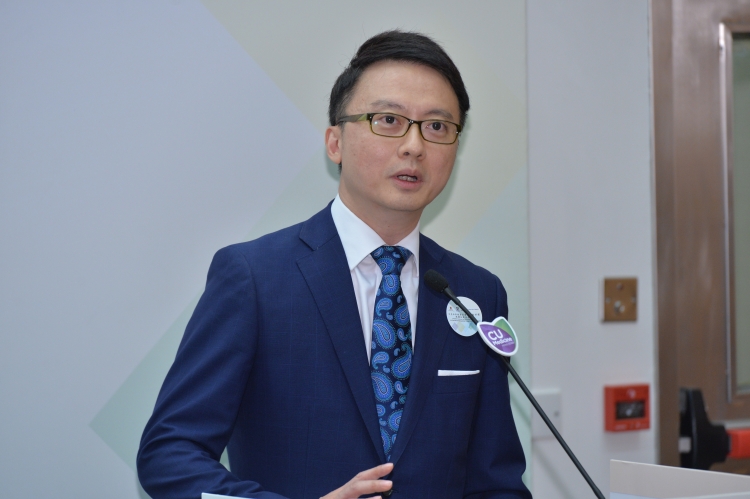
Prof Francis Chan, Dean of the Faculty of Medicine, CUHK said, ‘Training a clinician-scientist requires abundant resources and time and fortunately we are not alone on our way to reach the goal. Thanks to the generosity of Dr Lui, our Faculty is able to give financial support to MBChB students to advance his or her knowledge, build a connection, gain international exposure and make contributions to society when he or she returns home. Cultivation of a clinician-scientist requires six years of undergraduate study of medicine, plus four years of advanced study in a research profession, so, in all, at least ten years. The set up of the “Lui Che Woo Distinguished Young Scholars Award” is indeed a manifestation of the old saying “it takes ten years to grow a tree”.’
Diseases associated with aging, such as cancer, dementia and cardiovascular problems, have become increasingly common now, but they have also become more complicated. More than ever, we need to train up capable and experienced doctors, and we also need to nurture clinician-scientists for the future. “As a medical school of international standard, we must integrate medical education and medical research to ensure sustainable development. Without research, we will not be able to achieve medical advances. The two aspects must therefore be balanced. We must be focused on the training of committed and competent doctors and choose among them students who show the interest and capability in research and nurture them accordingly.” The Faculty of Medicine of CUHK has produced a number of brilliant researches in recent years, claiming new discoveries in relation to diseases such as stroke prevention, lung cancer, nasopharyngeal cancer and liver cancer caused by hepatitis B, which have resulted in the revision of local and even international medical guides.
Dr Timothy Cheng Hua-tse
DPhil in Medical Sciences, University of Oxford
MBChB, CUHK (Class of 2009)
Global vision is an essential element in university education. In recent years, the government has been making strong efforts to drive the development of new technologies. The generous support for scientific research and education afforded by philanthropists, such as Dr Lui Che-woo, has enabled talented, aspiring students to further their studies abroad and then contribute their knowledge for the benefit of the people of Hong Kong upon their return. The Lui Che Woo Institute of Innovative Medicine and the “Global Physician-Leadership Stream (GPS)” of CUHK are some of the institutions housing students with the potential to become clinician-scientists and bring new hope to the sustainable development of mankind.
Dr Timothy Cheng Hua-tse obtained an MBChB from CUHK and a doctoral degree from the Department of Clinical Medicine at the University of Oxford. He is currently practicing as a medical doctor and is also doing research in the field of genetics. He believes that scientific research is extremely important for the world of medicine and medical advances are emerging on a daily basis that shed new light on our previous knowledge.
“Research projects focus on important and challenging issues, and it requires sustained effort over a long period of time to tackle these issues. There are bound to be setbacks along the way, and statistically speaking, most experiments do not turn out as one would hope. Thanks to the support of those such as Dr Lui, we are equipped with the necessary resources, ancillary facilities, software, hardware and personnel to pursue our projects, despite the expensive and timeconsuming nature of scientific research,” said Dr Cheng.
Dr Ko Ho returned to Hong Kong in 2012 to set up laboratories at the Prince of Wales Hospital and the CUHK Faculty of Medicine with donations from Dr Lui Che-woo, He continued with his research in the visual nervous system and the neuronal network for motor control, and has plans to launch a research project on cerebral small vessel lesion.
Dr Ko conceded that setting up a laboratory is never easy. “It requires a large amount of start-up fund to build a laboratory for neuroscience research. We need to purchase expensive instruments, such as the laser on optical and visual cubes, without which we cannot proceed with our research. Dr Lui’s donations have mostly been used for the acquisition of instruments to ensure smooth progress of our research,” he said.
Dr Ko stressed the importance of philanthropic donations for such research programmes, which often command a large budget for the purchase of instruments as well as financial support for researchers.
Dr Ko Ho was recommended to further pursue a threeyear PhD programme in Neuroscience at University College London (UCL) in the UK. He recognized the importance of interdisciplinary research, under which academics in different areas of expertise work together and complement each other to resolve difficult issues, has become a dominant trend. Dr. Ko has continued to study and work in the laboratory since he came back Hong Kong. He hopes that there will be more people in the community who support medical research so that medical students who are interested in the research will have the opportunity to contribute to the improvement of the quality of human life through medical advances.
-
LUI Che Woo Prize - Prize for World Civilisation
Inaugural Prize Presentation Ceremony 03 Oct 2016 - Dr Lui Che-woo Chairman of K. Wah Group Visits Peking University to Share His Over 70 Years of Life Experience in Transcending Difficulties and Great Aspiration of Promoting World Civilisation 24 Jun 2016
- Dr Lui Che-woo Chairman of K. Wah Group officiates at the unveiling of the Hong Kong Education Foundation for Wuyi University Building at Jiangmen Wuyi University 03 Jun 2016
-
Young medical students encouraged to serve Hong Kong
“Lui Che-woo Distinguished Young Scholars Award” launch in CUHK 12 May 2016 - Dr Lui Che-woo Awarded the Degree of Doctor of Social Sciences Honoris Causa for His Contributions to the Community and Higher Education 15 Mar 2016
-
An Ordinary Life of Peace, Health and Happiness
Lui Che-woo Biography Sharing Session Took Place in Hong Kong 20 Jan 2016




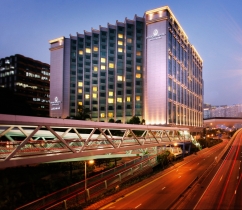
.jpg)
